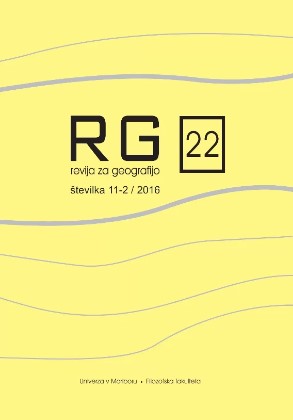Light pollution in Maribor
DOI:
https://doi.org/10.18690/rg.11.2.3982Keywords:
light pollution, Maribor, environmental protectionAbstract
Light pollution represents a new form of environmental pollution which is the result of excessive use of artificial lighting at night. The light pollution is the emission of light from the light sources that increases the natural illumination of the environment. Light pollution causes to human vision distraction illumination and a feeling of glare, it threatens the safety in traffic due to the glare, endangers the natural balance, disrupts the professional or hobby an astronomical observation and unnecessarily consumes power. In article are presented results of measurements of the light pollution, with the Sky Quality Metres in the area of the city of Maribor. Presented are also the results of the analyses of the light pollution roses and resources consumed for public lighting in the area of the municipality of Maribor.
Downloads
References
Bruce-White, C., Shardlow, M. 2011: Review of the impact of artificial light on invertebrates.
Buglife, Peterborough. (www.buglife.org.uk/News/newsarchive/News+Archive+2011/).
Falchi, F., Cinzano, P., Elvidge, C.D., Keith, D.M., Haim, A. 2011: Limiting the impact of light pollution on human health, environment and stellar visibility. Journal of Environmental Management. Volume 92, Issue 10. Elsevier.
Legiša, P. 2010: Svetlobno onesnaženje=zapravljanje energije. (http://temnonebo.splet.arnes.si/files/2011/02/legisa.pdf). (15.11.2016). https://doi.org/10.1016/j.jenvman.2011.06.029
Huemer, P., Kühtreiber, H., Tarmann, G. 2010: Anlockwirkung moderner Leuchtmittel auf nachtaktive Insekten. (www.hellenot.org).
Mikuž, H., Zwitter, T. 2007: Širjenje umetne svetlobe v atmosferi in vplivi na svetlobno onesnaženje nočnega neba s primeri iz Slovenije. (http://temnonebo.splet.arnes.si/files/2011/02/razsvetljava2005-hmtz.pdf).
Mizon, B. 2012: Light Pollution. Responses and remedies. Springer. London. https://doi.org/10.1007/978-1-4614-3822-9
Pauley, S.M. 2011: Lighting for the human circadian clock: recent research indicates that lighting has become a public health issue. Medical Hypotheses. Volume 63, Issue 4. Elsevier. https://doi.org/10.1016/j.mehy.2004.03.020
Petkovšek, Z., Hočevar, A. 1995: Meteorologija. Biotehnična fakulteta. Ljubljana.
Save+bugs+from+light+pollution).
Svetlobno onesnaženje in učinkovita zunanja razsvetljava. Društvo Temno nebo Slovenije. Ljubljana. 2010.
Uredba o mejnih vrednostih svetlobnega onesnaževanja okolja. Uradni list 81/2007. 7.9.2007. Ljubljana.
Internet 1: https://www.lightpollutionmap.info/#zoom=4&lat=4760028&lon=2068644&layers=B0TFFFFF (15.9.2016).
Internet 2: http://pxweb.stat.si/pxweb/Dialog/varval.asp?ma=05C5002S&ti=&path=../Database/Dem_soc/05_prebivalstvo/10_stevilo_preb/25_05C50_prebivalstvo_naselja/&lang=2 (15.9.2016).
Internet 3: http://www.maribor.si/podrocje.aspx?id=144 (15.9.2016).
Internet 4: http://pxweb.stat.si/pxweb/Dialog/varval.asp?ma=2221302S&ti=Dol%9Eine+cest+po+kategoriji%2C+ob%E8ine%2C+Slovenija%2C+letno&path=../Database/Ekonomsko/22_transport/02_22212_cestni_transport/01_22213_infrastruktura/&lang=2 (15.9.2016).
Downloads
Published
Issue
Section
License
Copyright (c) 2016 Igor Žiberna

This work is licensed under a Creative Commons Attribution 4.0 International License.
